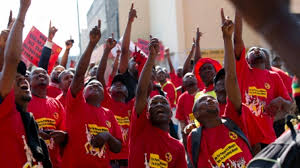Defence
Nigeria to start producing military uniforms by 2023 – ICRC
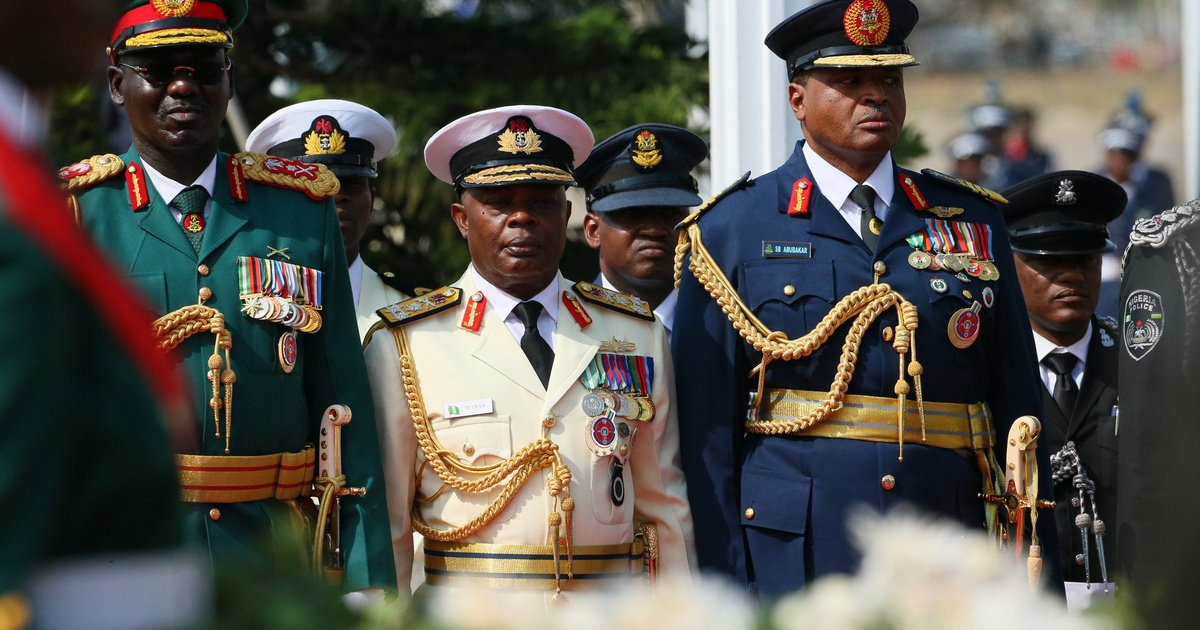
The Infrastructure Concession Regulatory Commission (ICRC) has disclosed that Nigeria will begin local production of uniforms for its military and paramilitary personnel from January 2023.
The commission said in a statement signed by its Acting Head, Media and Publicity, Manji Yarling, on Monday in Abuja, that the production of the uniforms would be a joint venture project.
The commission said that the Public-Private Partnership (PPP) between Defence Industries Corporation of Nigeria (DICON) and Sur Corporate Wear, would lead to the creation of Sur Corporate Wear Nig. Ltd.
“The DICON Sur collaboration which will span a concession period of 20 years, will be responsible for producing uniforms for the Army, Navy, Air force, Police, Civil Defence and other military and paramilitary organisations,” it said.
The Acting Director-General of ICRC, Micheal Ohiani, in a meeting, charged all stakeholders in the project to resolve all issues hindering the completion of the factory and report to the commission in one week.
Also, Dr Jobson Ewalefoh, Director, Contract Compliance Department, ICRC, during the rescheduled meeting, urged all stakeholders to ensure that the project was completed within the stipulated time frame.
Ewalefoh said that the project was important to the nation as it would curb capital flight and create no fewer than 920 jobs.
He said that the project would also be a thing of pride for the nation to produce its uniforms.
The director said that as the project progressed, the DICON Sur joint venture would be expected to begin to source all its raw materials from within Nigeria.
“The fact that we produce our military and paramilitary uniforms locally is a pride to all of us. It is a pride that we all must uphold.
“Sudan is producing their military kits and I know DICON can do it if they have the right support,” he said.
Ewalefoh assured all stakeholders that ICRC would liaise with all the relevant government agencies to fast-track the ongoing process of securing approval for off-takers when production would begin in January.
He said that going forward, ICRC through its Contract Compliance Department, would make the DICON Sur project a priority and monitor its progress until completed.
The director pledged that the commission would continue to intervene to make PPP projects operate smoothly.
The Managing Director, Sur Corporate Wear Nig. Ltd., Burhan Karabulut commended the management of ICRC for intervening and ensuring that the project was hitch-free.
Karabulut also commended the investors for agreeing to release funds for the completion of the project, following the intervention of ICRC and the meeting of stakeholders that ensued.
He said that the company had so far taken the project to 68 per cent completion, adding that the remaining funds for the project would be released soon to meet the completion goal.
“If the work resumes in July, it is assumed that we can start commissioning as of January 2023; but this January, the commissioning will not be 100 per cent production,” he said.
Karabulut, however, said that the designs for the uniforms had yet to be approved, adding that the company could not source its raw materials for production.
He said that without the approval, the production could not begin.
Defence
Shettima Leads Nation to Honour Fallen Heroes at 2025 Armed Forces Remembrance Day
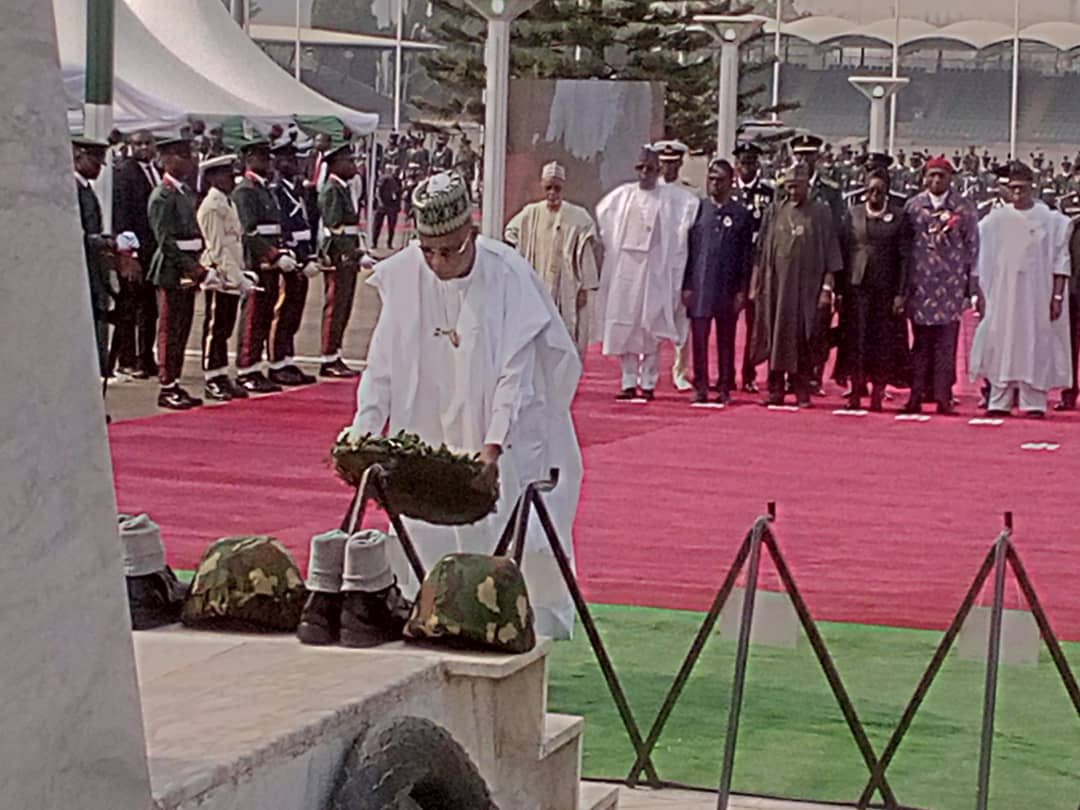
Vice President Kashim Shettima on Wednesday led a distinguished delegation, including Senate President Godswill Akpabio, members of the Federal Executive Council, National Assembly, service chiefs, and the diplomatic corps, to pay tribute to the nation’s fallen and living heroes.
The solemn occasion, held at the National Arcade in Abuja, featured a wreath-laying ceremony marking the climax of the 2025 Armed Forces Celebration and Remembrance Day (AFCRD).
Vice President Shettima was the first to lay a wreath, followed by Senate President Akpabio, Deputy Speaker of the House of Representatives Benjamin Kalu (representing Speaker Tajudeen Abbas), and Chief Justice of Nigeria Justice Kudirat Kerere-Ekun.
Other participants in the ceremony included Minister of Defence Muhammed Badaru, Minister of the Federal Capital Territory Nyesom Wike, Minister of State for Defence Bello Matawalle, and service chiefs led by the Chief of Defence Staff, Gen. Christopher Musa. The Inspector-General of Police, Kayode Egbetokun, also joined in paying respects.
Representatives of the diplomatic corps, the Nigerian Legion, and widows of fallen soldiers, led by Veronica Aluko, President of the Military Widows Association (MIWA), also laid wreaths to honour the heroes.
A traditional military salute followed, with the firing of three volleys, a symbolic act rooted in the age-old battlefield custom of pausing hostilities to retrieve the fallen.
The Vice President capped the event by signing the anniversary register and releasing ceremonial white pigeons, symbolizing peace and freedom.
The week-long celebration began on January 10 with a Jumma’at prayer at the National Mosque, followed by an interdenominational Christian service on January 12. Other highlights included a social and awards evening for military personnel, a regimental dinner and awards night for officers, and a lecture and art exhibition hosted by Defence Headquarters.
This year, the celebration, renamed Armed Forces Celebration and Remembrance Day, aims to honour both fallen heroes and serving personnel for their dedication to national peace and security.
Observed annually on January 15 in Nigeria, the day commemorates those who sacrificed their lives in global conflicts, including the First and Second World Wars, the Nigerian Civil War, peacekeeping missions, and internal security operations. It also serves as a platform to honour veterans and garner support for the families of the fallen.
As Vice President Shettima noted during the event, “Their sacrifices remind us of the cost of freedom and the unwavering commitment required to preserve our nation’s unity and peace.”
Defence
Armed Forces Remembrance Day: Makinde Reaffirms Commitment to Fallen Heroes’ Families
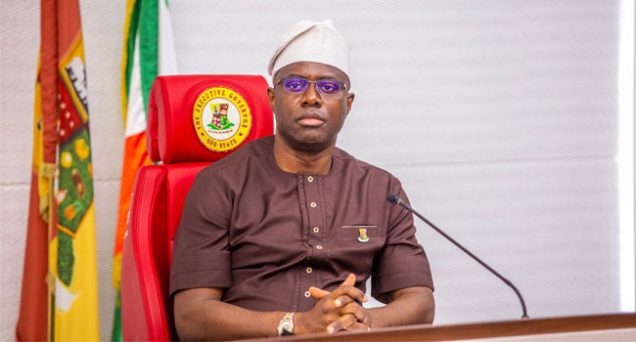
Gov. Seyi Makinde of Oyo State has reiterated his administration’s unwavering support for widows and children of fallen heroes, as well as the welfare of vulnerable ex-servicemen.
The governor made this pledge during the grand finale of the Armed Forces Remembrance Day celebration, held on Wednesday at the Arcade, Government House, Agodi, Ibadan.
Makinde emphasized that the state government would prioritize the welfare of those who had sacrificed for the nation’s unity and security.
“The fallen heroes paid the supreme price to ensure the country remained one, safe, and secure,” Makinde said.
He also commended the service commanders, officers, and men of all security agencies operating in the state for their dedication to maintaining peace and fostering economic growth.
“They are supporting this administration to maintain an environment where economic activities can thrive,” he added.
The chairman of the Nigerian Legion, Oyo State Command, Julius Ogunkojo, called on the government to address the needs of officers and men of the armed forces. He also appealed to well-meaning Nigerians to assist ex-servicemen in achieving better living standards.
The event featured the symbolic firing of rounds volley, laying of wreaths, and the release of ceremonial pigeons by the governor, symbolizing peace and unity.
The Armed Forces Remembrance Day, celebrated annually, honours the sacrifices of past and present military personnel for the nation’s security and sovereignty.
Aviation
NAF airstrikes destroy terrorist food depot, kill scores in Lake Chad
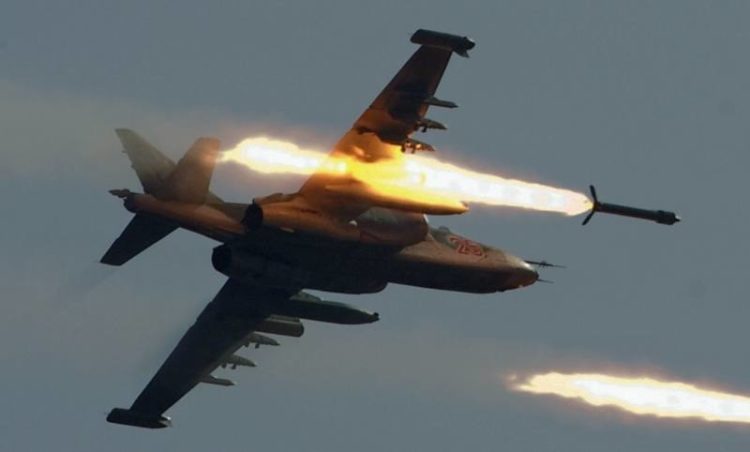
This is contained in a statement by the Director, Public Relations and Information, Nigerian Air Force (NAF), Air Commodore Olusola Akinboyewa, on Monday in Abuja.
Akinboyewa said the NAF aircraft carried out the operations in Nov. 23 on the strategic location, identified through meticulous intelligence efforts.
He said the location served as a critical food storage site and a sanctuary for terrorist commanders and fighters.
He added that intelligence had previously linked terrorists in the location to recent attacks, including the assault on troops in Kareto on Nov. 16.
According to him, the NAF fighter jets, in response, launched a robust air interdiction mission, destroying identified structures used as storage facilities and neutralising terrorists on-site.
“Mop-up operations using cannons ensured the complete elimination of fleeing hostile elements.
“The operation’s success was made possible by extensive Intelligence, Surveillance, and Reconnaissance (ISR) missions conducted over several days, confirming the presence of active terrorist structures camouflaged under dense vegetation.
“The destruction of the terrorist enclave, including food storage facilities, severely disrupted their logistical operations, while the neutralisation of a significant number of fighters diminished their capacity to launch future attacks,” he said.
Akinboyewa said the mission had demonstrated the NAF’s unwavering commitment to defending our nation and people, acting singly and supporting surface forces in counterterrorism operations.
He reiterated the NAF’s commitment to sustain robust independent and joint operations until all enemies of Nigeria’s prosperity and wellbeing are brought to justice.
-

 Headlines4 years ago
Headlines4 years agoFacebook, Instagram Temporarily Allow Posts on Ukraine War Calling for Violence Against Invading Russians or Putin’s Death
-

 Headlines4 years ago
Headlines4 years agoNigeria, Other West African Countries Facing Worst Food Crisis in 10 Years, Aid Groups Say
-

 Foreign4 years ago
Foreign4 years agoNew York Consulate installs machines for 10-year passport
-

 News1 year ago
News1 year agoZero Trust Architecture in a Remote World: Securing the New Normal
-

 Entertainment3 years ago
Entertainment3 years agoPhyna emerges winner of Big Brother Naija Season 7
-

 Headlines2 years ago
Headlines2 years agoNigeria Customs modernisation project to check extortion of traders
-

 Entertainment2 years ago
Entertainment2 years agoMovie download platform, Netnaija, announces closure
-

 Economy2 years ago
Economy2 years agoWe generated N30.2 bn revenue in three months – Kano NCS Comptroller












